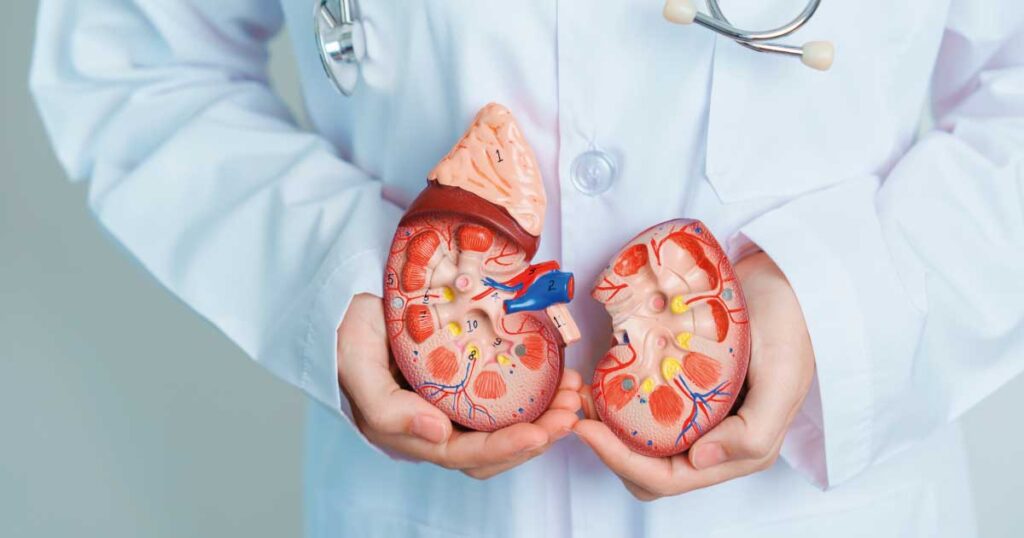Choosing between hemodialysis and peritoneal dialysis may seem like a complicated decision, but it is, above all, a choice about what best suits the day-to-day life and needs of each patient. Each method has its own particularities, advantages and challenges, and understanding these differences is the first step towards making an informed and calm decision.
So, come with us to explore, in a simple and practical way, what distinguishes these two options and how they can influence quality of life in the treatment of kidney failure.
What is dialysis?
It is a treatment that replaces some of the kidneys’ vital functions. Essentially, when the kidneys are no longer able to eliminate toxins and excess fluids from the body, this procedure becomes essential to maintain the chemical balance in the body. Dialysis acts as life support, removing metabolic waste, regulating potassium and bicarbonate, and removing accumulated fluids.
Although it does not fully replace all kidney functions, dialysis is essential for prolonging life and guaranteeing an acceptable quality of life for patients with chronic kidney failure.
What is peritoneal dialysis?
Peritoneal dialysis is an alternative that uses the peritoneal membrane as a natural filter. In this method, a dialysis fluid is introduced into the abdominal cavity via a catheter, allowing toxins and excess fluids to be removed by diffusion and osmosis.
There are two main types of peritoneal dialysis:
- Ambulatory Continuous Peritoneal Dialysis (CAPD): the patient manually performs several fluid changes throughout the day
- Automated Peritoneal Dialysis (APD): a machine carries out the changes during the night, giving you more freedom during the day.
This method is mostly done at home and offers greater autonomy and flexibility.
What is hemodialysis?
In hemodialysis, blood is removed from the body and filtered through a machine, where a dialyzer (or “artificial kidney”) removes toxins, excess potassium and accumulated fluids.
This process is usually carried out in dialysis centers or units, three times a week, for around four hours per session. Alternatively, it is possible to carry out hemodialysis at home, although this is less common.
The advantages of hemodialysis include the ability to quickly correct metabolic and water imbalances. However, it requires vascular access, such as a fistula or catheter, and can cause discomfort such as cramps or hypotension.
What are the causes of kidney failure?
- Diabetes is the most common cause of high blood sugar levels
- Hypertension, which damages the blood vessels in the kidneys over time
- Hereditary kidney diseases such as polycystic kidney disease
- Glomerulonephritis (inflammation of the kidney filters)
- Frequent urinary infections that can lead to serious kidney complications
- Excessive use of medication, especially painkillers and anti-inflammatories
- Urinary obstructions caused by kidney stones, tumors or prostate enlargement.

Hemodialysis and peritoneal dialysis: main differences
Both methods have advantages and disadvantages, and the choice depends on factors such as the patient’s state of health, lifestyle and personal preference. Here are the main differences between them:
When is hemodialysis the best option?
- For patients with chronic renal failure in advanced stages
- When peritoneal dialysis is not possible due to medical or lifestyle conditions
- Suitable for those who prefer a controlled environment, under the supervision of health professionals
- Ideal for patients who need to quickly remove toxins from the body.
And for whom is peritoneal dialysis the best option?
- Patients who wish to undergo treatment at home and have greater flexibility in their daily lives
- Those with vascular access difficulties, making hemodialysis impossible
- People with a stable routine who feel comfortable managing the process autonomously
- Those who prefer to avoid frequent trips to the hospital.
Where to have hemodialysis and peritoneal dialysis treatments?
Hemodialysis and peritoneal dialysis treatments can be carried out in various locations:
- Dialysis centers and units: these units are spread throughout the country and offer specialized support. See the list of units on the website of the Portuguese Renal Insufficiency Association (APIR).
- At home: both hemodialysis and peritoneal dialysis can be carried out at home in order to provide greater comfort and flexibility for the patient.
Do you need transportation for dialysis?
Ambula guarantees safe, comfortable transportation adapted to your needs for your hemodialysis or peritoneal dialysis sessions. Our team of professionals is ready to ensure that you reach your destination smoothly and on time.
If you need specialized transport for your treatments, you can count on Ambula!




